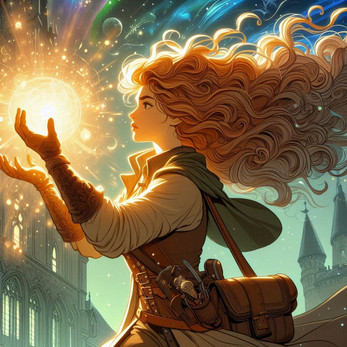Systems Design: The Four Aspects of Magic
A downloadable book
A magic system is a set of mechanics that explains how magic works in a world, much like the laws of physics explain the workings of our universe.
For some, magic should bear no explanation: The idea of it being beyond understanding is what is enticing about it. But even if that were the case, that would not mean there is no underlying system that explains it and by which it works. It just means that system is softer.
For me, a hard magic system that has proper, written rules, however flexible, makes for a more compelling storytelling device, where the use of magic can have downsides and require specific conditions, and would not be able to solve any situation ex-machina.
And so I came up with these Four Aspects of Magic Systems, each of which can be defined separate from one another, that when combined will give rise to an entire new form of magic.
Metaphysics
What is magic? Is it an energy? Is it willpower? Is it understanding? Perhaps it's the soul or aura. But where does it come from? Does it emanate from a powerful entity? From the stars? Does it flow into our world from another? These are the questions that pertain to the metaphysical realm. This, in any system, is the fundamental definition of what magic is, regardless (yet) of what it does, how it works when it reaches our world, and who gets to use it.
Medium
"Channeling", "summoning", "conjuring". This is the means by which magic is drawn in or brought forth. Depending on metaphysics, magic can flow more freely, or already be a part of the world, innate to certain beings, without a need to be channeled, only requiring tools for focus, or for direction, like wands or spellbooks. Perhaps magic is less mundane and requires calling out to it, via a recitation or a chant or a communion with another being. Perhaps there is an expenditure that needs to be made in order for an effect to take place. One could understand the medium of magic as how freely available it is. This aspect determines who is, and who isn't, a magic user.
Biology
By now we know what magic is and how it is brought out. It's time to start wondering the effect that it has, and we'll start first with the effect it has on those that cast it. Is a dragon magical? Is its breath harmful to itself or other dragons? What happens to a caster if their spells bounce back? Are those spells conducted from the body outwards? Is there a magical organ that draws forth the magic? Maybe an artifact that is connected to them? Perhaps they have special blood, or ar host to a parasite or symbiote, or have a higher count of a particular substance. Is the body of a witch strengthened to withstand their own spells, or is it just as frail as any human? This aspect considers if the body of a magic user is altered in any way, and how that affects the system itself.
Physics
The last or lowest aspect, and the most fun. What does magic do in the world? Does it allow its users to move things? Transform them? Perhaps these effects follow the laws of matter and energy that exist in our universe, or perhaps they produce new and amazing things that never existed before. Maybe it gives each user limited control over a specific element, substance, or realm of life. Or maybe magic in itself is an energy that already has an effect on the world, and can be transformed to have other effects.
Thank you for reading. There is a lot more to say about magic systems, but my hope is that, guided by these four aspects, our exploration will have a clearer focus.
| Updated | 26 days ago |
| Status | Released |
| Category | Book |
| Author | Santiago Casini |
